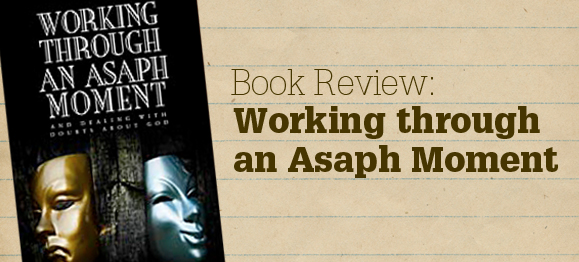
Welcome to the club!
It’s a club comprised of some of the stalwart heroes of the faith. You know, Abraham (Genesis 17:17), Sarah (Genesis 18:12), Gideon (Judges 6:13), Elijah (1 Kings 19:10), Jeremiah (Jeremiah 20:7), John the Baptist (Luke 7:19)…and Asaph.
We don’t think about Asaph that often. He’s probably not included in your kids’ Bible story book, and you may not even recognize his name. Asaph was the chief musician leading Israel’s temple worship during the reign of David. And he penned Psalm 73—one of the most transparent chapters in the Bible.
In Psalm 73, Asaph recorded his doubts about God—about God’s goodness, about God’s righteousness, about God’s faithfulness. And he recorded how God led him, not to suppress the doubts, but to work through them—in the sanctuary of God.
I recently came across a small book that is packed with helpful study regarding this Psalm. The book is titled Working through an Asaph Moment: and dealing with doubts about God. It is written by Tim Zacharias, pastor of the Community Baptist Church in Branford, Connecticut.
What makes this book even more powerful is that the author transparently shares his own wrestlings with doubt that have come over the years during his and his wife’s trials through burdens of life and ministry. And he shares God’s graciousness in using Psalm 73 to help him work through each season of doubt.
In truth, we all have times when we question God. We may not overtly put our doubts into words (even to ourselves), but we are prone to suspect Him of injustice or to question His dealings in our lives.
The most dangerous place to be during such doubts is alone. Not necessarily alone physically. (If you’re in ministry, that’s probably a rare option anyway.) But alone emotionally and spiritually. Alone in your doubts and alone with your thoughts.
Working through an Asaph Moment encourages you to bring your doubts into the sanctuary of God—to allow the Holy Spirit to lead you into God’s presence by faith and to use His Word and His truth to resolve your doubt. In fact, one of the things I greatly appreciated about this book is that it is rich in Scripture. In addition to Psalm 73, the author uses many cross references and draws truth from correlating passages.
I’m including a few of my highlights from this book below. If you are in a season in which you find yourself questioning where God is in relation to your struggles, I’d encourage you to read this book. I know that I will keep it on hand to share with others.
- Much of our doubting is not intellectual in nature—it is our underlying feelings that are at the source of uncertainty. Our doubts come from how we “feel” about our circumstances, and they are based on how we interpret them. The prominent issue is not facts but our emotional responses to what is happening in our lives. These are feelings that assault our beliefs and convictions.
- Many in the ministry become masters of repression. They know how to look happy on the outside while a cauldron of distress is brewing within.
- Our tendency is to become so accustomed to the rituals and religious motion of the Christian life that we lose our awareness of God Himself, and we lose the deep desire for Him and His truth.
- I have to stay close to God all the time. In the midst of adversity, I am more susceptible to doubts. Like Asaph, I have learned that when doubts come, there is only one place to go—into the sanctuary of God…
- In a clear-minded moment, it is easier to see how foolish [doubting] is. God can give us that clarity. In the sanctuary, clarity can and will happen. It requires a strong, convicting influence of God and His Word to erase the doubts from our minds, but there, in a place close to God, the removal takes place.
- Doubting God can become a habit if we let it. Over and over, as we respond in the same questioning manner, a pattern sets into our psyche.
- This is the believer’s goal in this life—to come to the place where we find our fulfillment for this life in God alone and look forward to being with Him more than anything else.
- When we know God is with us, there is within us a spiritual sense of emotional undergirding. God is holding us up.
- If it takes some temporal weaknesses and deprivation to liberate us from ourselves so that we can yearn for God and all that He has prepared for us in heaven, so be it.
- Anything is good if it carries the potential to draw you closer to God. And since everything in life carries that potential, it’s all good!



